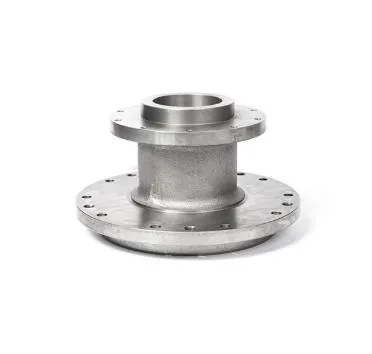Móvil:+86-311-808-126-83
Correo electrónico:info@ydcastings.com
Which Impeller Types Best Optimize Your Pump’s Efficiency?
Understanding the variety of impeller types available can dramatically improve the performance of your pump system. Pumps rely heavily on the impeller design to move fluids efficiently, and selecting the right one ensures optimal flow rates and pressure. From open to closed impellers, each type offers unique advantages depending on the application, fluid properties, and operational requirements. Making an informed choice about impeller types can reduce wear, energy consumption, and maintenance costs, ultimately enhancing pump longevity and reliability.

How Does a Bulkhead Connector Improve Pump Assembly?
A properly installed bulkhead connector plays a vital role in maintaining pump integrity, especially where fluid-tight seals are essential. These connectors allow for secure passage of pipes or cables through tank walls or bulkheads without leakage. Integrating a robust bulkhead connector in your pump system supports stable fluid flow and electrical connections, contributing to overall operational safety. When combined with appropriate sealing materials, these connectors minimize the risk of contamination and downtime, which is critical in industrial and commercial pumping setups.
Why Is the Right Cap Plug Essential for Pump Maintenance?
A high-quality cap plug is often overlooked but serves a critical function in pump systems by sealing openings and preventing ingress of dirt or moisture. During maintenance or idle periods, fitting a durable cap plug safeguards sensitive pump components from environmental damage. The presence of a reliable cap plug reduces the risk of corrosion and ensures that the pump remains in optimal condition, ready for immediate use. Selecting the right material and design for the cap plug based on the pump’s operating environment is essential for prolonging equipment life.
What Advantages Does an Impeller Pump Centrifugal Offer?
The design of an impeller pump centrifugal is engineered to convert rotational energy into fluid velocity effectively, making it one of the most widely used pump types globally. These pumps utilize a spinning impeller to generate centrifugal force, propelling fluids through the system with smooth and continuous flow. An impeller pump centrifugal provides excellent handling of low-viscosity fluids and can manage a broad range of flow rates and pressures. Its simple design facilitates easy maintenance and replacement of parts, which helps keep operational costs low and performance high.
In What Ways Can a Closing Cap Enhance System Safety?
A properly fitted closing cap is critical for sealing pump components, preventing leaks, and maintaining pressure integrity. In many pump systems, the closing cap acts as a protective barrier that stops foreign particles from entering critical areas and supports containment of the fluid being pumped. Using a sturdy and well-designed closing cap also minimizes the risk of hazardous spills or system failures. Selecting a cap compatible with the pump materials and fluid type ensures that safety and functionality are never compromised during operation.
How to Select the Best Impeller Types for Different Applications?
Choosing among impeller types requires understanding the fluid characteristics, such as viscosity, temperature, and particulate content. For example, open impellers are ideal for handling fluids with solids, while closed impellers provide higher efficiency with clean liquids. By evaluating the operational environment, engineers can select impeller designs that reduce clogging, cavitation, and wear, thereby improving pump lifespan and efficiency. Proper sizing and material choice also play a crucial role in optimizing the performance of various impeller types.
What Should You Consider When Installing a Bulkhead Connector?
Installation of a bulkhead connector involves ensuring a tight seal against leaks and matching the connector size to the system specifications. It’s important to verify compatibility with the pump’s pressure ratings and temperature ranges. Using quality gaskets or sealing compounds during the installation process helps maintain system integrity over time. Additionally, checking for corrosion resistance in the bulkhead connector materials ensures durability, especially in aggressive or harsh fluid environments.
Impeller Types, Bulkhead Connector, Cap Plug, Impeller Pump Centrifugal, and Closing Cap FAQs
Q: How do different impeller types affect pump efficiency?
A: Different impeller types influence flow dynamics, pressure output, and susceptibility to clogging, impacting overall pump efficiency and suitability for specific fluids.
Q: Can a bulkhead connector be retrofitted in existing pump systems?
A: Yes, many bulkhead connectors are designed for retrofitting, but proper sizing and sealing are critical to ensure no leaks occur post-installation.
Q: What materials are commonly used for cap plugs?
A: Cap plugs are often made from plastics, rubber, or metals such as brass or stainless steel, chosen based on chemical compatibility and temperature resistance.
Q: Are impeller pump centrifugal designs suitable for abrasive fluids?
A: While generally effective for clean fluids, specialized impeller designs or materials may be required for abrasive or particulate-laden fluids to reduce wear.
Q: How frequently should closing caps be inspected or replaced?
A: Regular inspection of the closing cap during routine maintenance is recommended, with replacement intervals depending on wear, environmental exposure, and fluid corrosiveness.
-
Materials Used in Manufacturing Cap End Pipe FittingsNoticiasNov.24,2025
-
Material Properties of CF8M CastingNoticiasNov.24,2025
-
How to Inspect Pump Cap Ends for DamageNoticiasNov.21,2025
-
Backward Curved Impeller – Efficient Airflow Solutions for Industry | YD CastingsNoticiasNov.21,2025
-
Automobile Water Pump - Efficient, Quiet, Durable & ElectricNoticiasNov.21,2025
-
Impeller for Pumps – High-Efficiency, Durable, OEM-ReadyNoticiasNov.21,2025











